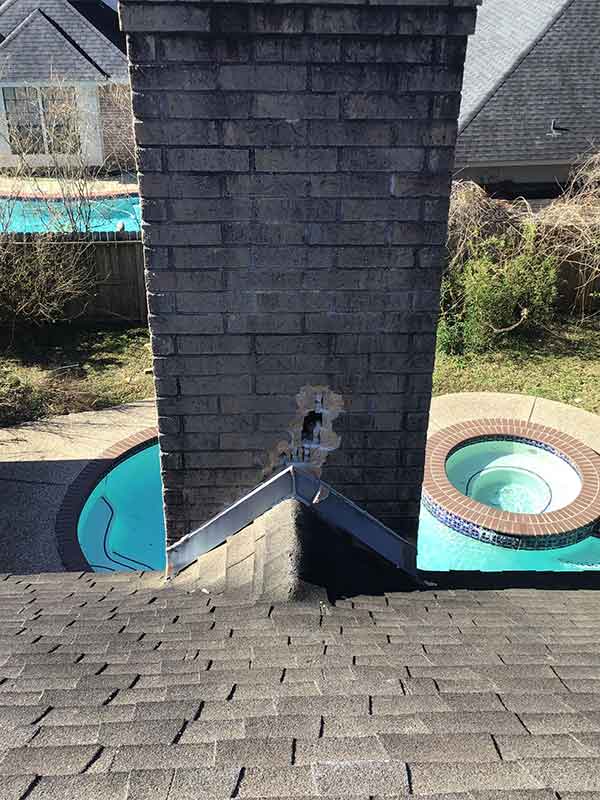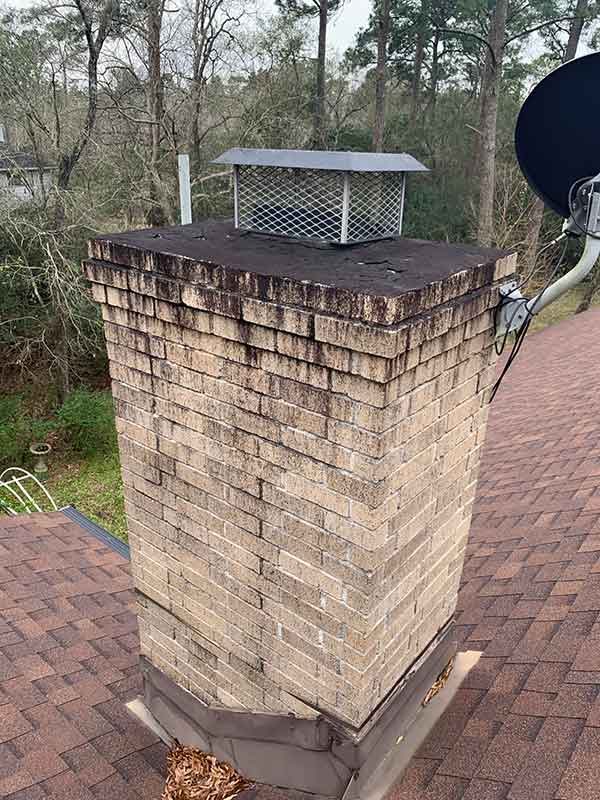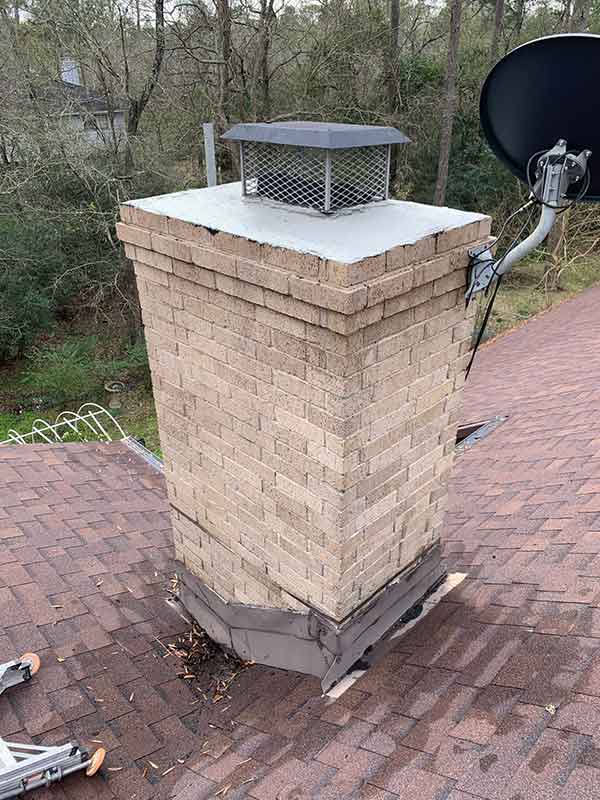For Chimney & Fireplace Repairs in Houston & Beaumont, Hire Lords Chimney
Has Mother Nature brought your chimney down in value or left it severely battered? Scorching heat, rainy days, and the expansion/contraction process that occurs in between the seasons can inflict major damage on a chimney. Add to that wind, hail, and severe weather, and chimneys that are aging or that were improperly built can erode or topple over altogether. If your chimney is looking worse for the wear, don’t put off calling Lords Chimney.
A chimney that’s leaning or missing bricks or masonry poses a danger to your property and those on it. A damaged chimney may also prove to be a fire hazard. Make an appointment today for a chimney inspection so you can rest easy knowing that your chimney is in good working order and that your fireplace is ready to be enjoyed as safely as possible.
Get started with Lords Chimney. Dial 281-497-4000 or reach out online today.

Lightning Struck Exterior

Before Moldy Chimney

After Moldy Chimney
Why Does My Chimney Still Smell After a Sweeping?
One of the most common complaints we hear at Lords Chimney is, “My chimney stinks!”
The solution seems simple enough – schedule a sweeping to get the gunk out. Yet, homeowners are often surprised to learn that a cleaning or even some leak repairs don’t always resolve the issue. This is because, in many cases, the smell isn’t just from soot or creosote buildup…it’s from air being pulled down the chimney, thus inviting common (and unavoidable) chimney odors into your home.
This is often a result of negative air pressure inside the house, which can make your chimney act like a vacuum. And no matter how well we sweep your flue, you’re still going to get odors. Fortunately, our experienced team knows how to diagnose and fix these issues properly, whether it means correcting airflow imbalances, introducing make-up solutions, or adjusting the height or size of your chimney.
If you’re tired of chimney odors near Houston or Beaumont, call the team that knows how to solve the problem for good – that’s us at Lords Chimney.
What Type of Chimney Repair Services Does Lords Chimney Offer?
Lords Chimney is your one-stop shop for anything chimney related. Whether it’s part of routine maintenance, like a cleaning, or a more in-depth job such as tuckpointing, our chimney sweeps are certified by the Chimney Safety Institute of America (CSIA), so they’re fully capable of diagnosing and treating chimney issues.
- Pressure Washing: Pressure washing is exactly what it sounds like – we use a high-pressure water stream to clean the exterior of your chimney by removing dirt, debris, stains, mold, mildew, and anything else that can accumulate on your chimney over time. Stains can be surface-level and completely harmless, but they can also indicate an underlying problem with your chimney (for example, white stains are called efflorescence and could be a sign that you have a moisture problem).
- Tuckpointing: Over time, exposure to weather and fluctuations in temperature can cause mortar to deteriorate. Crumbling, cracking, or eroded mortar joints weaken the overall structure of the masonry which can then cause it to lean. When this happens, we’ll recommend tuckpointing. This is the process of removing deteriorated mortar joints between the bricks of your house, then adding in new mortar. It improves the appearance of the home’s masonry and restores the structural integrity of the chimney.
- Crown Repair: Your chimney crown is a crucial component that keeps water out of your chimney. It’s the concrete slab at the top of the chimney that diverts rain away from the sides of the structure. If the chimney crown was built using subpar materials or constructed incorrectly, it might not last as long as originally expected. In addition, a poorly built crown might lack the proper slope to shed water effectively, making it prone to water damage.
- Top-Sealing Damper Installation: A top-sealing damper is a type of damper that is installed at the top of the flue, just above the chimney crown or chase cover. Its primary purpose is to seal off the chimney when it’s not in use, stopping drafts, heat loss, and rainwater from entering the flue. Top-sealing dampers create a more effective seal than throat dampers, and they’re great for improving energy efficiency because they’re better at preventing cold air from entering the home during chillier months – and keeping conditioned air from escaping when temperatures rise.
- Firebox Repair: The firebox is the part of the fireplace where the fire burns. Firebrick and refractory mortar are the most common materials used in fireboxes because of their ability to withstand extreme temperatures. With regular use, the firebox can become damaged due to heat, moisture, and general wear and tear. Loose bricks, cracks, and holes in the mortar or brick are telltale signs that you need a firebox repair.
If you have a prefabricated chimney, that’s no problem either. We offer repair services for both masonry and prefabricated fireplaces and chimneys, and we are experts in keeping chimneys up to code and finding Underwriters Laboratory (UL)-tested parts so that your prefabricated fireplace will retain its proper safety listing.
Get Your Free Virtual Assessment Today!
Smelly or Smoky Fireplace? We Can Figure Out What’s Going On
If smoke is backing up into your living space when your fireplace is lit, it could be happening for a few different reasons. A malfunctioning damper or a blockage is often to blame, but it could also be because of a flue that isn’t a good fit for your chimney. Another possibility is that you’re due for a cleaning.
On the bright side, a smoky fireplace doesn’t necessarily mean there’s a serious issue. You might just need some professional maintenance, or maybe you can fix the problem on your own. For instance, cold chimneys tend to push smoke back into your space because cool air is heavier than warm air. A good hack is to preheat the chimney on cooler days by lighting a small roll of newspaper and holding the burning end at the top of your firebox.
Funny smells coming from a fireplace can also be an indication that something isn’t quite right – in fact, this is usually the case. If the odor is musty, you may have a water leak that’s causing mildew and mold growth. Other unpleasant odors might be a hint that an animal family has moved in. Squirrels, raccoons, and birds frequently take over chimneys to nest, especially during cooler seasons.
What Are Common Chimney & Fireplace Issues?
No two chimneys are exactly the same and we customize our care plans based on the specific needs of each of our customers. However, there are some problems we’ve seen more consistently over the nearly two decades we’ve been in business.
-
- Creosote buildup. Burning firewood produces creosote, a flammable and sticky substance that adheres to the walls of the chimney. As we mentioned earlier, creosote greatly increases the risk of a chimney fire due to its flammable nature. In addition, if too much creosote accumulates, it can restrict airflow and trap smoke within the chimney.
- Damaged masonry. Fireplaces and chimneys are exposed to extreme heat. While they’re engineered to endure high temperatures, long-term exposure will lead to deteriorating brick and mortar. Weather is another major contributing factor to damage. Waterproofing can help protect your chimney from the elements and extend its lifespan, but wear and tear will happen eventually.
- Air flow blockages. When chimney caps and crowns are damaged, it’s easier for debris to get into your chimney. Obstructions can impact the flow of smoke and gases, up the chances of a house or chimney fire occurring, and increase the risk of carbon monoxide exposure.
- Damper problems. A malfunctioning damper can prevent proper airflow, affecting combustion efficiency and potentially causing smoke to enter the home. If your throat damper is in rough shape, we may suggest upgrading to a top-sealing option.
When Does a Chimney Need To Be Rebuilt?
Sometimes, a chimney is too damaged for simple repair work and a rebuild may be in your best interest. A chimney rebuild may sound like a big deal, but it’s more common than you may think. We understand that an extensive chimney project is tough to face, but you can get ahead of minor issues before they advance to this point by keeping up with annual inspections and cleanings.
These are some instances where we may recommend a chimney rebuild:
Leaning or tilting. A chimney that is visibly leaning, tilting, or showing signs of shifting is a significant danger to those in the household – or anyone walking by for that matter. Leaning chimneys can collapse, causing damage to the nearby property and potential harm to your family and your neighbors.
Masonry deterioration is too far gone. If the masonry of the chimney has extensive deterioration, cracks, or spalling, it can compromise the chimney’s stability and safety. Severe erosion or crumbling mortar joints can also weaken the chimney, which can lead to falling bricks.
Cracks and settling. Large, deep cracks in the chimney or signs of significant settling can indicate serious structural issues. If cracks are wide and continue to grow, they may compromise the chimney’s integrity.
Untreated water damage. If you suspect a chimney leak, call a certified chimney professional right away. Prolonged exposure to water and moisture can cause bricks to break down. Catching leaks early and fixing the root cause can preserve your chimney and save you money.
Damage from a chimney fire. Most homeowners don’t know they’ve had a chimney fire until there’s a chimney inspection. A chimney can withstand a lot, but direct contact with flames won’t leave it unharmed – and it definitely shouldn’t be put to use. The heat and stress from a fire can cause bricks and mortar to crack as well as warp liners.
There are underlying structural issues. Craftsmanship matters. If the chimney is not properly integrated into the structure of the house or if it was poorly constructed from the beginning, it may need to be rebuilt to ensure stability and safety.
Your home is a historical landmark. In some cases, a chimney may need to be rebuilt to adhere to local historic preservation guidelines. This ensures that the chimney maintains its original appearance and structural integrity – just with updated materials.
When Is the Best Time to Book Chimney Repairs?
If the repairs you need are minor or you need to book a routine service, the best time for chimney repairs is in the off-season during the spring and summer months. It’s also the ideal time for certain masonry work since some of the materials we use need a little while to cure or dry. Once fall arrives, our schedule gets busier. We don’t want you to have difficulty locking in an appointment, so the earlier you schedule, the better.
All that said, some issues just can’t wait. If you’re in your burning season, and something changes in your chimney – you notice new smells, sounds, or visible issues – hold off on using your fireplace and reach out to our experts as soon as possible. And, of course, don’t hesitate to schedule an appointment if you experience an emergency situation like a sudden weather event or a chimney fire.
How Much Do Chimney Repairs Cost?
That’s a tough question to answer – and, unfortunately, we can’t give an accurate estimate until one of our sweeps can give your chimney a thorough assessment. What repairs you need is determined entirely by what we uncover during an inspection.
To put it simply, it would be disingenuous of us to try to stick you with a price point that doesn’t reflect the work that needs to be done, and you should be wary of companies that provide pricing without setting foot on your property. They’re likely trying to lure you in, only to upsell you on further services later on.
Think of it like this: You can’t call a restaurant and ask for an estimate of your bill if they don’t know what you plan on ordering. Are you sticking to just an entree or will you be going all out with an appetizer and dessert? A fancy steak dish with all the fixings will run you more than a chicken sandwich. While we’d love to put your mind at ease with a clear-cut list of expenses, we need to see what’s going on first. You can always reach out to our customer service team and they will be happy to answer as many cost-related questions as they can before an inspection.
And if you need help with financing? Well, we have great options for you there too.
Dial 281-497-4000 or get in touch with us online today.
Are Chimney Repairs Covered by Homeowners Insurance?
Depending on your policy, your homeowners insurance may cover the cost of chimney repairs. In most cases, insurance companies will require you to show proof that your chimney has been well-maintained. For instance, if you had a chimney fire, but you didn’t have sweepings regularly, your insurance provider might determine that you are at fault and deny your claim. We strongly suggest that you keep receipts and chimney inspection reports should you need to file a claim in the future.
A common exception is a sudden occurrence such as severe weather conditions, a lightning strike, and flooding. If something crashes into your chimney, like a tree limb or a flying debris, your insurance company will likely cover repair expenses. Even if your damage doesn’t fall into one of these categories, you should always explore your options with homeowners insurance.
Can I Prevent Chimney Damage?
The truth is, most chimney damage is avoidable. If you’re willing to commit to a solid maintenance plan, you can stop chimney issues in the beginning stages. Here are a few tips to keep your chimney in good condition:
- Schedule regular inspections. The CSIA and National Fire Protection Association (NFPA) recommend an annual inspection at the bare minimum (yes, even if you don’t use your chimney). Consider two or more inspections per year if you use your fireplace often.
- Don’t skip sweepings. Like inspections, you should get your chimney cleaned or swept at least once a year. When creosote buildup reaches an eighth of an inch, your chances of a chimney fire go up significantly.
- Get repairs done promptly. It’s better for you when we can identify problems and address them early. For instance, it’s much easier and cheaper to fill in a few cracks in your chimney liner than it is to reline or replace it.
- Don’t use your fireplace as an incinerator. The only thing you should burn in your chimney is the fuel source that is intended for it. Don’t throw trash or food in your fireplace, as it can increase soot and creosote build-up. If you have a wood-burning fireplace, only use seasoned wood (wood that has been left out to dry for several months).
- Get to know your chimney. You can’t spot changes in your chimney’s performance if you’re not familiar with how it usually functions. When you know how your fireplace is supposed to operate, you arm yourself with the information needed to know when it’s time to consult a professional.
Don’t Delay Chimney Repairs – Hire Lords Chimney for All of Your Chimney Service Needs
When you don’t recognize an odor that’s coming from your fireplace or you see evidence of a chimney leak (or spot anything else amiss), call Lords Chimney. Don’t take a wait-and-see approach if you suspect that there’s a problem with your chimney because small problems can easily become major ones the longer they go untreated.
If you’re in the Houston or Beaumont area, Lords Chimney is a local chimney company you can trust with repairs of any scale. You can schedule an appointment by phone at 281-497-4000 or reach out to us online. We can’t wait to speak with you soon.
Schedule your leaky chimney repair with us right away. This is one chimney service you don’t want to ignore!
